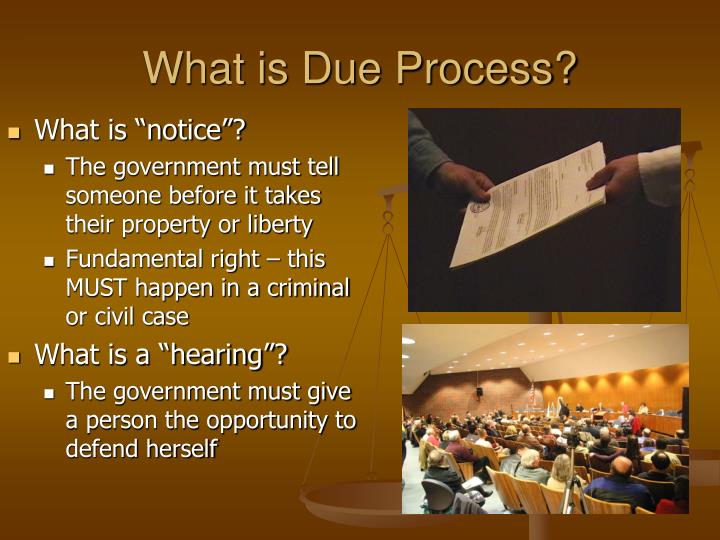


Any legal proceeding enforced by public authority, whether sanctioned by age or custom or newly devised in the discretion of the legislative power, which regards and preserves these principles of liberty and justice, must be held to be due process of law.) Accord Hurtado v. It must be pursued in the ordinary mode prescribed by law it must be adapted to the end to be attained and whenever necessary to the protection of the parties, it must give them an opportunity to be heard respecting the justice of the judgment sought. 701, 708 (1884) ( Due process of law is, following the forms of law, is appropriate to the case and just to the parties affected.

However, the specific procedures needed to satisfy due process vary depending on the circumstances.
#Due process definition full#
Thus, where a litigant had the benefit of a full and fair trial in the state courts, and her rights are measured, not by laws made to affect her individually, but by general provisions of law applicable to all those in like condition, she is not deprived of property without due process of law, even if she can be regarded as deprived of property by an adverse result. When a protected interest is at stake, due process generally requires that the procedures by which laws are applied must be evenhanded, so that individuals are not subjected to the arbitrary exercise of government power. 702 (1997) (no liberty interest in assisted suicide). 261 (1990) (liberty interest in refusing medical treatment) Washington v. of Health Supreme Court of the United States, 497 U.S. Some due process cases involving questions of life and death are brought based on a claimed liberty interest. The scope of the life interest has not been the subject of significant litigation. and where state laws create an expectation related to individual liberty. Modern cases have found protected liberty interests in the exercise of constitutional rights 9 FootnoteĮ.g., id. In modern cases involving alleged property interests, the Court has often decided whether a property interest exists by considering whether a law or government policy created an entitlement-a reasonable expectation that a government-provided benefit would continue. In the 1960s and 1970s, the Court adopted more expansive views of the liberty and property interests, holding that the Due Process Clause protects some non-traditional interests such as conditional property rights and liberty and property rights created by statute. 37, 40 (1877) ( The revenue laws of a State may be in harmony with the Fourteenth Amendment to the Constitution of the United States, which declares that no State shall deprive any person of life, liberty, or property without due process of law.). and the property interest attaches to the ownership of personal and real property. The Court has always accepted that the liberty interest includes the interest in freedom from physical restraint 5 FootnoteĮ.g., Allgeyer v. When considering whether a protected interest is at stake, the Supreme Court traditionally looked to the common understanding of the terms life, liberty, and property, as embodied in the common law.

But the range of interests protected by procedural due process is not infinite.). When protected interests are implicated, the right to some kind of prior hearing is paramount. 564, 569–71 (1972) ( The requirements of procedural due process apply only to the deprivation of interests encompassed by the Fourteenth Amendment’s protection of liberty and property. Unless one of those protected interests is at stake, the Due Process Clause does not apply. Broadly speaking, procedural due process requires state actors to provide certain procedural protections before they deprive a person of any protected life, liberty, or property interest. 134 (1974) see also Amdt5.6.1 Overview of Due Process Procedural Requirements to Amdt5.6.3 Military Proceedings and Procedural Due Process. The Supreme Court has construed the Fourteenth Amendment’s Due Process Clause to impose the same procedural due process limitations on the states as the Fifth Amendment does on the Federal Government. The Due Process Clause of the Fourteenth Amendment provides that no state shall deprive any person of life, liberty, or property, without due process of law. No State shall make or enforce any law which shall abridge the privileges or immunities of citizens of the United States nor shall any State deprive any person of life, liberty, or property, without due process of law nor deny to any person within its jurisdiction the equal protection of the laws. All persons born or naturalized in the United States, and subject to the jurisdiction thereof, are citizens of the United States and of the State wherein they reside.


 0 kommentar(er)
0 kommentar(er)
